#dodder river
Explore tagged Tumblr posts
Text
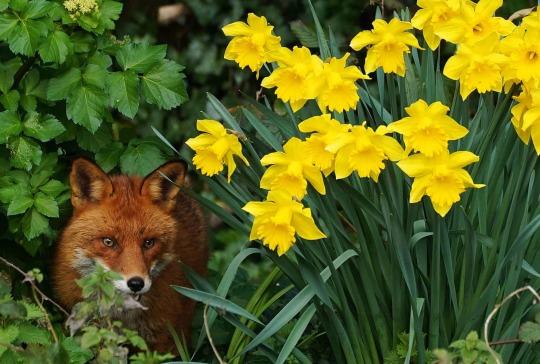
A fox among blooming daffodils on the banks of the Dodder River in Dublin, Ireland
Photograph: Brian Lawless/PA
#brian lawless#photographer#pa#fox#animal#mammal#wildlife#daffodils#river bank#dodder river#dublin#ireland#nature
285 notes
·
View notes
Text
I was walking by a river in Portland and saw this from far away:
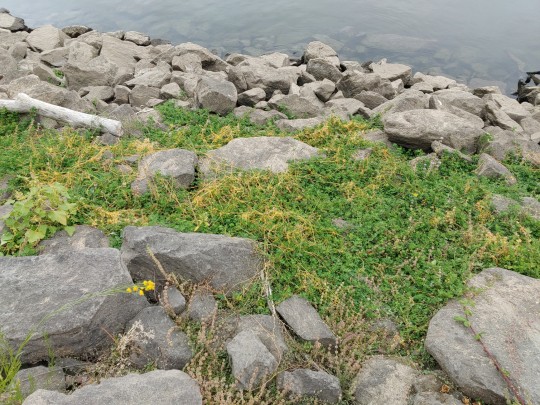
There's a lot of dead yellow plant life but the yellow here looked so intense! And stringy?! So I thought "haha what if it's my favorite plant that I've never seen in person that's be neat but probably not!"
Well it WAS!!!

The tapeworm of wildflowers!!!
I can recognize dodder a mile away apparently just from having seen photos but I couldn't possibly tell you what the normal green plant is that it's sucking on
587 notes
·
View notes
Text
Ancient Irish Royal Taboos
“The ancient kings of Ireland, as well as the kings of the four provinces of Leinster, Munster, Connaught, and Ulster, were subject to certain quaint prohibitions or taboos, on the due observance of which the prosperity of the people and the country, as well as their own, was supposed to depend.
Thus, for example, the sun might not rise on the king of Ireland in his bed at Tara, the old capital of Erin; he was forbidden to alight on Wednesday at Magh Breagh, to traverse Magh Cuillinn after sunset, to incite his horse at Fan-Chomair, to go in a ship upon the water the Monday after Bealltaine (May day), and to leave the track of his army upon Ath Maighne the Tuesday after All-Hallows.

Hill of Tara in County Meath, Leinster, Ireland.
(Source: Deichtine, CC BY-SA 4.0 https://creativecommons.org/licenses/by-sa/4.0, via Wikimedia Commons)
The king of Leinster might not go round Tuath Laighean left-hand-wise on Wednesday, nor sleep between the Dothair (Dodder) and the Duibhlinn with his head inclining to one side, nor encamp for nine days on the plains of Cualann, nor travel the road of Duibhlinn on Monday, nor ride a dirty black-heeled horse across Magh Maistean.

Mount Tonelagee and the Glendasan River, which flows through the Wicklow Mountains in Leinster.
(Source: Joe King, CC BY-SA 3.0 https://creativecommons.org/licenses/by-sa/3.0, via Wikimedia Commons)
The king of Munster was prohibited from enjoying the feast of Loch Lein from one Monday to another; from banqueting by night in the beginning of harvest before Geim at Leitreacha; from encamping for nine days upon the Siuir; and from holding a border meeting at Gabhran.

A castle in Munster, Gortmakellis, Tipperary.
(Source: Mike Searle / Castles of Munster: Gortmakellis, Tipperary (2))
The king of Connaught might not conclude a treaty respecting his ancient palace of Cruachan after making peace on All-Hallows Day, nor go in a speckled garment on a grey speckled steed to the heath of Dal Chais, nor repair to an assembly of women at Seaghais, nor sit in autumn on the sepulchral mounds of the wife of Maine, nor contend in running with the rider of a grey one-eyed horse at Ath Gallta between two posts.
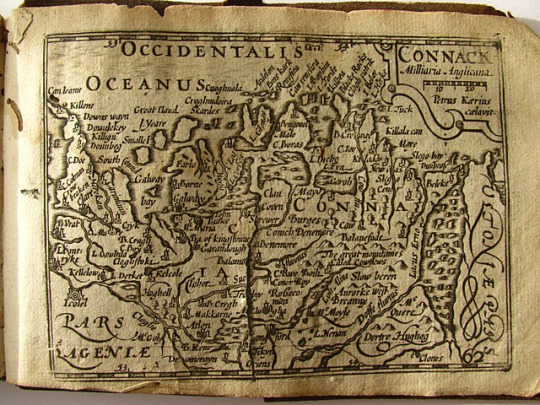
Map of Connaught, by John Speed (1627).
(Source: John Speed, Public domain, via Wikimedia Commons)
The king of Ulster was forbidden to attend the horse fair at Rath Line among the youths of Dal Araidhe, to listen to the fluttering of the flocks of birds of Linn Saileach after sunset, to celebrate the feast of the bull of Daire-mic-Daire, to go into Magh Cobha in the month of March, and to drink of the water of Bo Neimhidh between two darknesses.
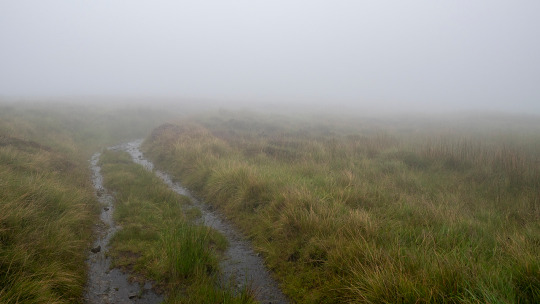
The foggy trackway of Slieve Gallion in Ulster.
(Source: Track, Slieve Gallion by Rossographer, CC BY-SA 2.0 https://creativecommons.org/licenses/by-sa/2.0, via Wikimedia Commons)
If the kings of Ireland strictly observed these and many other customs, which were enjoined by immemorial usage, it was believed that they would never meet with mischance or misfortune, and would live for ninety years without experiencing the decay of old age; that no epidemic or mortality would occur during their reigns; and that the seasons would be favourable and the earth yield its fruit in abundance; whereas, if they set the ancient usages at naught, the country would be visited with plague, famine, and bad weather."
—J. G. Frazer, Taboo & the Perils of the Soul (The Golden Bough, vol. III, 1914, pp. 11-12).

The Stone of Destiny, atop the Hill of Tara.
(Source: Ianfhunter, CC BY 4.0 https://creativecommons.org/licenses/by/4.0, via Wikimedia Commons)
#ireland#ancient ireland#tabu#Leinster#Munster#Connaught#Ulster#Tara#Hill of Tara#stone of destiny#Beltane#all hallows#samhain#may day#jg frazer#the golden bough#the golden bough vol iii
3 notes
·
View notes
Text
do you know i could break beneath the weight / of the goodness, love, i still carry for you
🎵 “unknown / nth” by hozier
📍 river dodder, dublin, ie
34 notes
·
View notes
Text
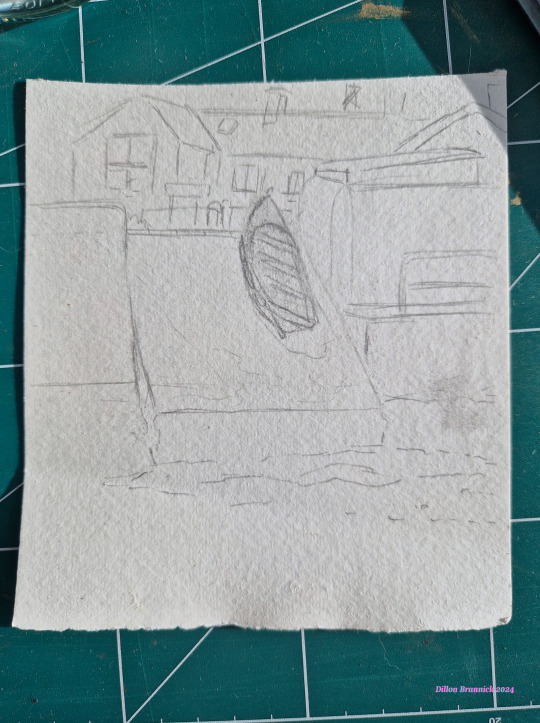
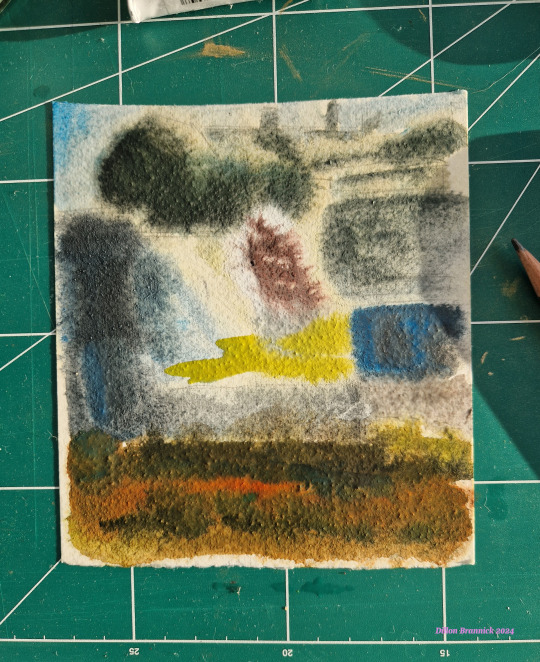

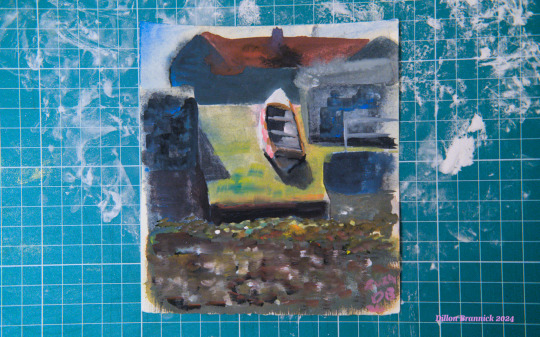
I've been looking at Kazuo Oga's work (it's too good) the last day or two so I broke out the gouaches to paint this little scene of the river dodder.
4 notes
·
View notes
Text
Warrior Cats Prefixes List- D
I had a WC Name Generator on Perchance that I made but I don't seem to have access anymore, so I'm remaking it here as just a simple list. The definitions used are the ones that Clan cats have for those things, and thus are the origins of the names. Definitions used are whatever I found when I googled it.
Dace-: "[noun] a small freshwater fish of the minnow family, typically living in running water"
Dahlia-: "[noun] a tuberous-rooted Mexican plant of the daisy family, which is cultivated for its brightly colored single or double flowers"
Daisy-: "[noun] a small grassland plant that has flowers with a yellow disk and white rays"
Daffodil-: "[noun] a bulbous plant that typically bears bright yellow flowers with a long trumpet-shaped center"
Damselfly-: "[noun] a slender insect related to the dragonflies, having weak flight and typically resting with the wings folded back along the body"
Dance-: "[verb] (of a cat) move in a quick and lively way; [noun] a series of movements that utilize speed and rhythm"
Dancing-: "[noun] the activity of dancing for pleasure or in order to entertain others"
Dandelion-: "[noun] a widely distributed weed of the daisy family, with a rosette of leaves, bright yellow flowers followed by globular heads of seeds with downy tufts, and stems containing a milky latex"
Dapperling-: "[noun] an agaric and possibly poisonous mushroom in the family Agaricaceae"
Dapple-: "[noun] a patch or spot of color or light; [verb] mark with spots or rounded patches"
Dappled-: "[adj] marked with spots or rounded patches"
Dark-: "[noun] the absence of light in a place; [noun] a dark color or shade; [adj] with little or no light; [adj] (of a color or object) not reflecting much light; approaching black in shade"
Darner-: "[noun] a large slender-bodied dragonfly"
Dart-: "[noun] an act of running somewhere suddenly and rapidly; [verb] move or run somewhere suddenly or rapidly"
Dash-: "[noun] an act of running somewhere suddenly and hastily; [verb] run or travel somewhere in a great hurry"
Dawn-: "[noun] the first appearance of light in the sky before sunrise"
Day-: "[noun] the part of the day when it is light, the time between sunrise and sunset"
Deathcap-: "[noun] a deadly poisonous basidiomycete fungus, one of many in the genus Amanita"
Deep-: "[adj] extending far down from the top or surface"
Deer-: "[noun] a hoofed grazing or browsing animal, with branched bony antlers that are shed annually and typically borne only by the male"
Delta-: "[noun] a wetland that forms as rivers empty their water and sediment into another body of water, such as an ocean, lake, or another river"
Deluge-: "[noun] a severe flood"
Dew-: "[noun] tiny drops of water that form on cool surfaces at night"
Dewberry-: "[noun] a trailing European bramble with soft prickles and edible fruit which has a dewy white bloom on the skin"
Dewdrop-: "[noun] a drop of dew"
Dill-: "[noun] an aromatic annual herb of the parsley family, with fine blue-green leaves and yellow flowers"
Dim-: "[adj] (of a light, color, or illuminated object) not shining brightly or clearly; [verb] make or become less bright or distinct"
Dimming-: "[verb] make or become less bright or distinct"
Dipper-: "[noun] a short-tailed songbird related to the wrens, frequenting fast-flowing streams and able to swim, dive, and walk under water to feed"
Dive-: "[noun] a plunge head first into water; [noun] a steep descent by an aircraft or bird; [verb] plunge head first into water; [verb] (of an aircraft or bird) plunge steeply downward through the air"
Dizzy-: "[adj] having or involving a sensation of spinning around and losing one's balance; [verb] make (someone) feel unsteady, confused, or amazed"
Dock-: "[noun] a perennial plant that grows from taproots, related to sorrel"
Dodder-: "[noun] an annual seed-bearing parasitic vine in the dodder family"
Doe-: "[noun] a female deer"
Dog-: "[noun] domesticated carnivorous mammal that typically has a long snout, an acute sense of smell, nonretractable claws, and a barking, howling, or whining voice"
Dogbane-: "[noun] any of a genus (Apocynum of the family Apocynaceae, the dogbane family) of often poisonous plants chiefly of temperate-zone regions with milky juice and fibrous bark"
Dogwood-: "[noun] a shrub or small tree of north temperate regions, which yields hard timber and is grown for its decorative foliage, red stems, or colorful berries"
Dot-: "[noun] a small round mark or spot; [verb] mark with a small spot or spots"
Dotted-: "[adj] marked with or in the form of dots"
Dotterel-: "[noun] a small plover with a brown streaked back and a chestnut or buff belly with black below"
Dove-: "[noun] a stocky seed- or fruit-eating bird with a small head, short legs, and a cooing voice. Doves are generally smaller and more delicate than pigeons, but many kinds have been given both names"
Down-: "[noun] the layer of fine feathers found under the tougher exterior feathers of birds"
Downy-: "[adj] covered with fine soft hair or feathers"
Dragonfly-: "[noun] a fast-flying long-bodied predatory insect with two pairs of large transparent wings which are spread out sideways at rest"
Dream-: "[noun] a series of thoughts, images, and sensations occurring in a person's mind during sleep; [noun] a cherished aspiration, ambition, or ideal"
Dreaming-: "[verb] experience dreams during sleep; [verb] indulge in daydreams or fantasies about something greatly desired"
Drift-: "[noun] a continuous slow movement from one place to another; [verb] be carried slowly by a current of air or water; [verb] (especially of snow or leaves) be blown into heaps by the wind"
Driftwood-: "[noun] wood drifted or floated by water"
Drizzle-: "[noun] light rain falling in very fine drops; [verb] rain lightly"
Drop-: "[noun] a small round or pear-shaped portion of liquid that hangs or falls or adheres to a surface"
Droplet-: "[noun] a very small drop of a liquid"
Drought-: "[noun] a prolonged period of abnormally low rainfall, leading to a shortage of water"
Dry-: "[adj] free from moisture or liquid; not wet or moist"
Duck-: "[noun] a waterbird with a broad blunt bill, short legs, webbed feet, and a waddling gait"
Duckling-: "[noun] a young duck"
Dune-: "[noun] a mound or ridge of sand or other loose sediment formed by the wind, especially on the sea coast or in a desert"
Dunlin-: "[noun] a migratory sandpiper with a down-curved bill and (in the breeding season) a reddish-brown back and black belly"
Dunnock-: "[noun] a small passerine, or perching bird, found throughout temperate Europe and into Asian Russia"
Dusk-: "[noun] the darker stage of twilight"
Dust-: "[noun] fine, dry powder consisting of tiny particles of earth or waste matter lying on the ground or on surfaces or carried in the air"
Dusty-: "[adj] covered with, full of, or resembling dust; [adj] (of a color) dull or muted"
4 notes
·
View notes
Text
There is a bit of a flu bug going around the retirement home, and unfortunately Virginia gets very sick from it.
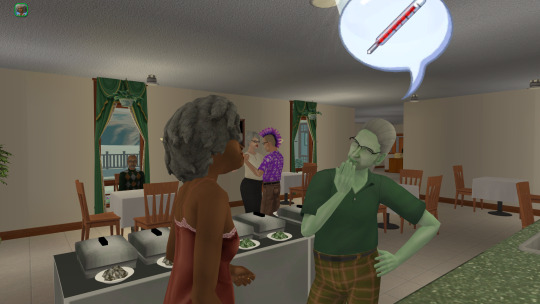
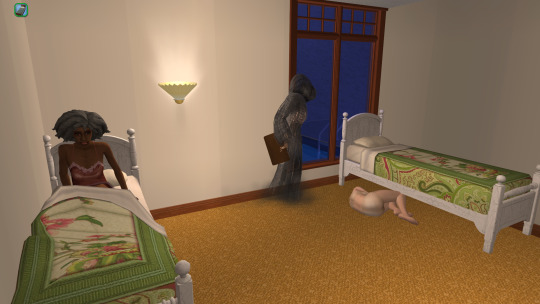
Scot is heartbroken at the loss of his wife, and in his grief he becomes obsessed with grilled cheese, which is doubly tragic for him because the retirement home doesn't have a stove, and he can only eat elder mush. I considered moving him in with relatives, but I don't think Circe and co in Nerissa's household would tolerate a doddering old man obsessed with cheese, River and Dirk's households are already very full, and he's not very close to any of his other relatives. So he's staying here for now.
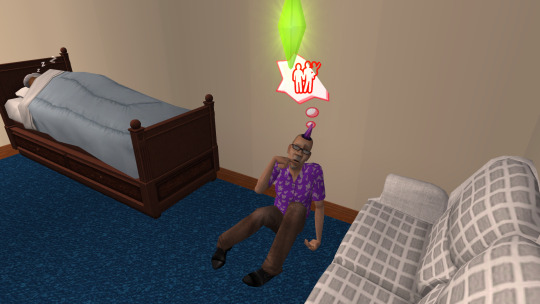
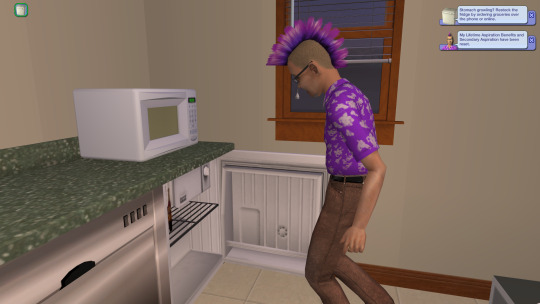
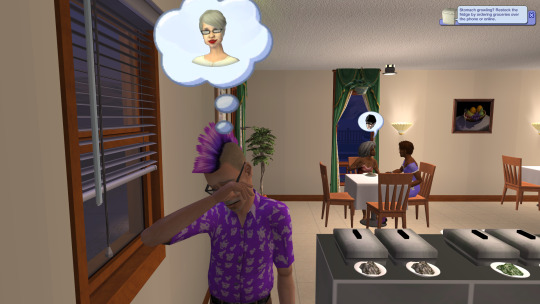
6 notes
·
View notes
Text
A SECTION OF THE DODDER LINEAR PARK
A SECTION OF THE DODDER LINEAR PARK
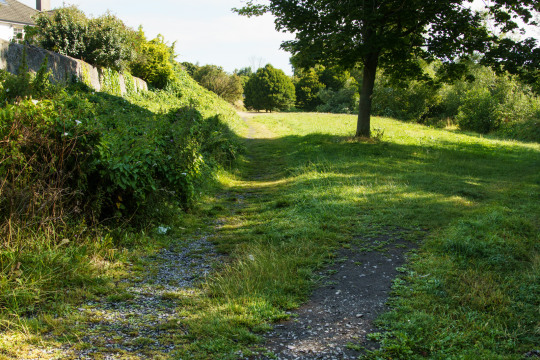
View On WordPress
#2022#areas of dublin#august#dodder#dodder river#dodder view#dodder view road#Fotonique#Infomatique#linerar park#Nature#Public Park#rathfarnham#springfield park#Streets Of Dublin#trees#William Murphy#woods
0 notes
Text
Every time you treat an enfranchised, establishment Democrat like Biden as a doddering old fool who is out of touch and doesn't understand anything about what's going on, you're doing what the Democrats want actually. Democrats aren't your awkward, embarrassing, but ultimately harmless aunts and uncles. They're vicious warmongers. They are violent racists, just as much if not more so than many establishment Republicans, but with a deliberate enough vocabulary to placate large swathes of their liberal voter base. They won't hesitate to sell you down the river the second they get the chance. Democrats count on their Incompetent and Spineless and Defanged images to keep you from rolling up to their houses and blowing their fucking brains out because if the general public understood that Democrats are cold, calculating, manipulative, heartless, violent, and joyful participants in this fucking merry-go-round they've put us on, rather than victims of the System, just like Us, we'd put them in the ground in a second. Joe Biden was a segregationist btw. Why on earth do you think he would do anything to help anyone? Democrats are "powerless" to do things that would be good and just because things that are good and just take power out of their hands and out of the capitalist class. Biden can squash unions in a second, increase military funding to bomb more 3rd world countries, keep kids in cages, and btw lie about every single campaign promise and never be held accountable for that, but he can't ACTUALLY protect abortion rights. Oh and Congress can unanimously change daylight savings time in a heartbeat but they can't ameliorate the climate crisis because that's not conducive to their bourgeois interests. Democrats can never Actually Do something that helps us. Not without ceding power to the people, which is too dangerous of a game for Democrats. Biden and his sycophants can't protect Black people or trans people or Jews For Real because the second he provides something materially, something REAL and not smoke and mirrors bullshit, to vulnerable Americans the grip that white supremacist and capitalist exploitation has on the people weakens ever so slightly. Democrats are not in government to fight for the people, they're in government to play shitty civil war reenactments of social liberties through a thinly veiled allyship with their Republican counterparts. American politicians only care about upholding America's capitalist and imperialist hegemony and any domestic concern that doesn't pertain to this can kick rocks. And btw the Democratic party as an institution doesn't give a shit if Republicans kill every minority in the country because Democrats literally aren't even there to protect us. They are there to protect class interests. They just run PR for The System and fundraise lmao. I hope you dumb fucking liberals who keep lashing out at leftists for not sacrificing ourselves at the altar of Electoral Politics are having fun watching the Wizard of Oz piss all our rights away while you hold his dick graciously in your hands.
55 notes
·
View notes
Text

A cormorant dries its wings by the Dodder River at Clonskeagh in Dublin, Ireland
Photograph: Nick Bradshaw/PA
#nick bradshaw#photographer#press association#cormorant#bird#animal#dodder river#clonskeagh#dublin#ireland#nature
19 notes
·
View notes
Text

A kingfisher dives from the branch of a tree on the banks of the River Dodder, in Dublin, Ireland. Photograph: Brian Lawless/PA | wildlife pictures; Guardian Newspaper #kingfisher #riverdodder #ireland
3 notes
·
View notes
Text
🎵 “through me (the flood)” by hozier
📍 river dodder, dublin, ie
#music#nature#hozier#through me (the flood)#the other half of this path is flooded#couldn’t take video of a flooding river and not do this
34 notes
·
View notes
Text
According to the beau ideal of Chinese politics—as with most authoritarian systems—high-stakes debates over policy and power are meant to be conducted behind a thick and soundproof curtain. The public, much less the outside world, should receive a glimpse of nothing more textured than a smooth and placid surface of the machinery of state. The aim here, of course, is to suggest serene unanimity and magnify the authority and prestige of the leader.
That, at least, is the theory. Over the course of a few awkwardly filmed seconds near the conclusion of a quinquennial session of the ruling Chinese Communist Party this weekend, reality seemed to briefly shred the gleaming veneer that is intended, revealing drama worthy of playwright William Shakespeare. The scene in question arrived at the moment of what was designed to be the crowning glory of China’s leader, Xi Jinping, after he had engineered changes to the party’s rules that would allow him, in principle, to remain at the helm of power as long as he cared to—or, for a 69-year-old man, the rest of his life.
Without audible opposition, Xi had also just effectively purged some of the only figures in his party who could be imagined as standing for policies and a style of governance different from his own. Those unceremoniously dismissed included his own premier, Li Keqiang, once considered a contender to lead China himself. Li had created a stir in August when, during a visit to Shenzhen, China, he proclaimed that “China’s reform and opening up will continue to move on. The Yellow River and Yangtze River will not flow backward,” which some experts hopefully took to signal continued flickering resistance to Xi. Ominously and remarkably though, the sitting premier’s comments were quickly scrubbed from the Chinese internet.
The weekend’s other prominent ouster involved the former party leader of Guangdong province, Wang Yang, who had once notably pronounced these very un-Xi-like thoughts: “We must eradicate the incorrect idea that happiness is a benevolent gift from the party and the government.” He advocated gradualist political reforms in China centered on creating more space for civil society as well as for “thought emancipation.”
Then, before the session could close with smiles all around, performing uniform faith in Xi’s greatness, something unexpected and still mystifying occurred. Seated to Xi’s left, his immediate predecessor, the 79-year-old Hu Jintao, looking surprisingly gray and frail, was suddenly rustled from his chair—to all appearances against his will—and led out of the hall, leaving an empty seat near the very center of the front row.
Hu did not exit the stage before first reaching for a sheath of papers that sat in front of Xi, causing Xi to grasp them. Almost all of the top leaders who were seated nearby stared determinedly ahead as if pretending that nothing noteworthy was taking place. But as one of the men who was ushering him out tugged at his shoulder, Hu spoke a few words to Xi, who remained expressionless as he nodded, and then Hu managed to pause again to tap his protégé, Li, on the shoulder before finally being moved off camera.
Predictably, news broadcasts in China edited out these scenes completely, but word got around quickly of the unusual spectacle.
Xi’s apparatus leaned on King Lear to provide an explanation. Hu’s actions were those of a doddering and unwell old man. Although possible, this is hardly the most likely or satisfying explanation of the day’s events. As political scientist Joseph Torigian wrote in his recently published book, Prestige, Manipulation, and Coercion: Elite Power Struggles in the Soviet Union and China After Stalin and Mao, “critical junctures are moments when politics are at their most ‘visible,’ and thus they allow us to theorize about limitations and possibilities for the future.”
Here, the possibility that thrusts itself immediately into consideration is that Hu, often dismissed as a faceless, weak, and ineffectual leader during his 10 years in power from 2002 until Xi’s anointment in 2012, had chosen this moment to publicly mark his disagreement with the management of the party under Xi, which has brought about an extraordinary and stifling concentration of power into one man’s hands.
To grasp the logic behind this interpretation requires a bit of history, particularly of how Hu himself rose to power and then sought to exercise it. Hu’s takeover in 2002, which was set in motion before the death of then-rapidly aging patriarch Deng Xiaoping in 1997, was meant to usher in a new era of regular, peaceful, and institutionalized transfers of power in a country that had never known such a thing. This was to take place on a firmly scheduled 10-year basis divided into two terms, which theoretically offered the party the ability to remove a bad or unpopular leader after a first five-year term in office.
The mechanics of Deng’s new system also took some of the power out of a given leader’s hands in terms of choosing his own successor, allowing the party to play more of a role in the elevation of future leaders. In Hu’s case, the power to name a successor was removed altogether from the hands of Deng’s immediate successor, Jiang Zemin, because Deng himself, whose authority was unchallenged in the late 1990s, placed Hu in line to eventually replace Jiang.
Hu’s time in office, which coincided with the six years I spent as a reporter in the country, is often caricatured as directionless—a supposedly wasted decade for China. In fact, his legacy in power is a highly complex one.
In some ways, this was a golden age for the country, with very fast economic growth and enormous strides in living standards for most Chinese. Hu was no democrat, of course, but the explosion of the internet made for unaccustomed space in terms of expression in the country. Hu’s premier, Wen Jiabao, sought to put a human face on government, publicly expressing concern for the poor and people left behind on many occasions.
Hu’s most important political initiative was an attempt to institutionalize a more collective style of rule than China had ever known. As political scientist Susan Shirk shows in her new book, Overreach: How China Derailed Its Peaceful Rise, Hu did this by creating balanced representation in the country’s most important decision-making bodies among different stakeholders, including the party apparatus, the government, representatives of provincial governments, and the military.
Most importantly though, he expanded the very highest instance of power in China, the Politburo Standing Committee, from seven to nine members and openly chose to rule as first among equals instead of as an all-imposing figure. Remarkably, Hu explained this as “an effort to prevent arbitrary decision-making by a single top leader,” which was one of Deng’s key fears after the long and capricious reign of former Chinese leader Mao Zedong.
This brings us to Xi, who has just very clearly sought to go about as far as one could in the opposite direction, vesting almost all power in his own person, surrounding himself with yes men and proven loyalists, and exacerbating that very risk.
Before discussing Xi any further though, it is worth spending a moment considering how things worked out under Hu. His collective style of rule may have been well intentioned, but it created big problems of its own. The buck seemed to stop nowhere, meaning that each member of the supreme Politburo Standing Committee was allowed to run his own fief in one sector or another of the economy or national security system, with members seldom opposing one another’s actions even in private on the intuited basis that this would prevent others from interfering with their own pet projects and patronage. Under Hu, it often seemed—in other words—that no one was in charge, and corruption took off on an alarming scale.
We will probably never know with any high degree of resolution what happened with Hu, who literally left the political stage on Saturday, probably never to be seen again—a cipher down to the end of his public life. What we do know is that the seemingly unscripted and unharmonious nature of his exit created an embarrassment for Xi, deliberately or not.
And the shadow of these events underlines a fundamental weakness to a Leninist system like China’s: a debility that no amount of tinkering by Mao (who presided over the deaths of two designated successors), Deng (who ousted Mao’s final designated successor, Hua Guofeng, for reasons that appear to have had much more to do with personal ambition and entitlement than with ideological or policy differences and then created a formula for future transitions), Jiang Zemin (who began his retirement according to schedule but clung to secondary titles for years and worked to undermine Hu’s authority and constrain his choices), and now least of all, Xi, is likely to be able to resolve.
Xi’s approach, in fact, resembles nothing so much as a return to the origin of Leninist systems—and particularly to the example of another ruler for life, former Soviet leader Joseph Stalin. Xi has built a personality cult and packed the new Politburo Standing Committee with political Lilliputians—men of small political stature who have no previous experience of central government and limited power networks of their own—who thus pose no challenge to him.
This includes Li Qiang, the man who is likely to be named Xi’s premier next year to replace the now-banished Li Keqiang. Few analysts can imagine Li Qiang—who was loathed in his previous post as the most powerful official in Shanghai, where he oversaw suffocating quarantines during a recent COVID-19 outbreak—as an eventual successor to Xi. And that seems to be the point.
As University of California San Diego political scientist Victor Shih argues in his new book, Coalitions of the Weak: Elite Politics in China From Mao’s Stratagem to the Rise of Xi, this is a tactic Mao introduced late in his rule, when his priority shifted from questions of ideological legacy or even the future of China to thwarting the rise of challengers and ensuring his own political longevity.
The lesson here is that Leninist systems are inherently unstable, in large part because both the ruling party and the top leaders govern above the law. As Americans have been powerfully reminded in the wake of the crisis surrounding the Jan. 6, 2021, attack on Congress, one of the most important features of any stable society is respect for laws of succession. But in China, all is still naked power struggles, usually well hidden from the public but unencumbered by firm rules; in such circumstances, good endings are not to be expected.
5 notes
·
View notes
Text
Snapetober 2021
I haven't had the chance to do any of the prompts yet, but I've been waiting for this one! Thanks to @sxvxrxssnape.
Day 26 "Don't leave me"
These are two excerpts from my fanfic series The Prince and the Crow. They include my oc Petronella Blishwick; friend to our favourite acerbic Potions Master.
The first takes place on the night of the Potter's murder, the second over ten years later. Both find Severus at his lowest point.
Content/Trigger Warning: Mention of death. Depictions of suicide attempt and ideation. Depictions of verbal abuse. Graphic depiction of self harm. Blood. Cutting. Alcohol Abuse.
31st October 1981 - [Full chapter here]
The gaping, yawning hole inside has been steadily opening, swallowing everything in it’s path. Severus wants to be angry, to take revenge – anyone will do – but especially on Albus Dumbledore. He was supposed to keep them safe. Keep her safe. He was the leader of the light wasn’t he? The only wizard strong enough to oppose the Dark Lord. Severus had gone to him, thrown himself upon the man’s mercy, promised to do anything – literally anything – in return for protecting Lily. But now she is dead.
The Dark Lord is dead too, but not by the great Dumbledore’s hand. No. Dumbledore was nowhere to be seen when Severus’ master laid waste to the pure and innocent witch. He should throw every hex he knows at the doddering old fool! But his anger is swallowed up by that yawning emptiness. He hardly hears the old man’s words when he tells Severus that Lily’s son has survived, or that the Dark Lord may yet return. Instead he staggers to the fireplace and floos to his home, blocking it behind him with wards. Except this empty house is not really his home. There was little warmth and comfort here. Only the echoing insults of his father. The only brightness from his childhood was pretty Lily. So joyful and kind. Their days spent in the park or by the river were an oasis, away from his father’s cruelty. But now the happy, smiling voice in his head fades and is replaced by angry vitriol.
‘Worthless little runt.’ The hulking man spits on breath thick with the smell of liquor. ‘Evil, that’s what you are. It’s not natural. I never should have laid with your mother. The witch! She tricked me…’
Perhaps his father had been right all along. He was evil. The things he had done. The things he had seen. It was he who had pointed the wand of his master at the woman he loved!
Worthless, stinking, evil.
Time to rid the world of the stain of Severus Tobias Snape. He raises his wand to his temple, the words forming on his tongue. But before he can cast the curse, his wand is pulled from his grasp. Without pausing to wonder who has robbed him of his death, he leaps for a cupboard and starts to pull out bottles and vials, but they all vanish from his hands. No! Why is he being denied this final mercy? Is he too rotten even for the sweet embrace of death? The chasm engulfs him entirely. All that he is is emptiness.
Somewhere outside of himself a warmth surrounds him. A hand strokes his head. Mother? Lily? No, they are both gone.
‘Don’t leave me Sev.’ A voice drifts in from a long way away. ‘Don’t leave me you bastard.’ It shakes. Like a leaf settling on the ground, the voice touches his conscious mind and pulls him slowly, slowly back. He looks up at a crack of light in the darkness and crawls up, up, and opens his eyes.
~~~
June 1992 [full chapter here]
It is late in the evening and a crescent moon sits in a purple sky. Petra takes the back alley behind the terraced houses. The boundary wall and gate are warded, but a quick transformation allows her to fly over the wall and into the small yard. Summoning all of her anger, pain, along with everything positive she feels for the man locked inside, she blasts open the back door and steps into the small kitchen.
The sight that greets her fills her with panic and she rips a sharp knife from Severus’ hand. His left forearm is a mess of blood spilling from three angry gashes around the faded skull and snake that marks him. A dark sticky pool is spreading across the table top, threatening to spill over the edge to the floor. ‘Fuck, Sev.’ She pushes down her panic and her tears, banishing the knife completely and conjuring gauze and bandages. His head rolls to one side to observe his intruder from behind a greasy curtain of hair. ‘I ‘ave to ger it off.’ He mumbles, a slight twang of West Midlands accent slipping out.
Petra casts vulnera senentur and presses the gauze over his arm, squeezing down with enough pressure to make him wince. ‘You fucking idiot bastard.’ She growls at him, as her heart tears apart a little. He looks up at her with a curled lip, his breath stinking of whiskey, and she has to resist the urge to slap his stupid face, and then the urge to kiss it. ‘Accio pepper up, accio blood replenisher, accio Dittany.’ She says, adding a flick of her wand. She also sets the kettle boiling for coffee, just managing to catch the potions that come flying up from the basement.
With a quick glance under the gauze she casts a cleansing charm over the wounds and reapplies pressure, then uncorks the blood replenisher and tips it into his mouth. ‘Swallow.’ She instructs firmly. He just about manages to follow her instruction, only coughing slightly. She peels back the gauze completely this time and pours the essence of dittanyover the cuts. They are deep and surprisingly precise given his obvious level of inebriation. For a second she almost wonders if she should have allowed him to continue, before wincing at the thought of the cut that would be required to peel off that entire section of skin. That’s if it would even be possible.
She quells the thought of what would have happened if she hadn’t arrived when she did, and turns her attention back to healing the injuries. The dittany is beginning to do it’s job of sealing the wounds and the bleeding has stopped. She cleans the rest of his arm, and banishes the blood from the table, then conjures fresh gauze, setting it gently along his forearm, and wrapping the entire area firmly in clean bandage.
The kettle had boiled a couple of minutes ago, and ignoring her slight shakiness, she summons the cafetière and grounds. She takes a small sip of the pepper up herself, then tips the rest down Severus’ throat. The glazed look in his eyes clears slightly and he straightens himself a little in his chair. Petra rises and pours the coffee manually, putting her back to him for a minute to give him time to compose himself. Then she returns with two full cups, taking a deep sip herself as she sets a mug in front of him, along with a large glass of water.
They sit drinking the coffee in silence.
‘I’m sorry.’ Severus says eventually.
Petra shudders then, as she has no more tasks to hold back the thought of the blood pooling and his head lolling to the side.
‘You could have bled out.’ She says.
He hangs his head and Petra leans forward, throwing her arms around his shoulders and burying her face into his neck.
The wetness on his neck as her chest shudders sobers Severus more quickly than the coffee could.
‘You said you wouldn’t leave me.’ Her muffled voice trembles. He wraps his arms around her, squeezing tightly, wincing at the pain in his arm, along with a wave of guilt and shame. ‘I just wanted it gone.’ He rasps. Petra pulls away and sits back in her chair.
‘It doesn’t define you.’ ‘Yes. It does.’
#snapetober 2021#pro snape#severus snape#harry potter fanfic#snape community#snape fanfiction#harry potter prequel#good severus snape#original character#harry potter original character
9 notes
·
View notes
Note
Aragorn and Boromir: one of them was late to/forgot about an event for the arguments thing!
Alright! They didn’t argue-argue because they REFUSED. Idiots. But they did have some weird emotional conversations so that’s as good as we’re going to get. I hope you enjoy!
Title: Sweet is the Air
Pairing: Aragorn/Arwen/Boromir - basically.
Summary: Set in the same time-line/AU World of Naming the World & My Land is Bare. So, Boromir survived Amon Hen, to everyone’s great joy. The main plot-points remain mostly the same. Barring some people living who died in the canon.
This is post-ROTK. Denethor remains alive, the ghost at the banquet.
--
‘Did you forget?’ Aragorn asks.
‘I didn’t,’ Boromir says.
Aragorn repeats: But did you? It’s alright if you did.
‘I didn’t,’ Boromir insists.
Aragorn wishes the man would just admit to it. Yes, he forgot. How hard is that to say? Yes, it slipped his mind that they were going to have a Talk with Denethor about The State of the Stewardship. Or, more truthfully, Yes, he forgot because he wanted to forget because he doesn’t want to talk to his father about The State of the Stewardship.
‘Do you know how hard it is to corner your father?’ Aragorn asks, attempting to not be annoyed. Because he isn’t annoyed. This is only the third time this has happened, after all. And the first occurrence of Boromir’s lateness to the Denethor Conversation had a legitimate cause; the second - well it could be argued to be legitimate. A third time though?
But he’s not annoyed.
(Arwen, last night, You’re annoyed. Aragorn, insistent, I am not annoyed. Arwen raised an eyebrow and therefore looked eerily like her father, For some reason I remain unconvinced. Have you told him you’re annoyed? This made Aragorn scowl and so he therefore looked like a statue of one of his dead relatives, Why should I do that? I’m not annoyed. There’s nothing to talk about. Arwen, I’ll tell him if you don’t. To which Aragorn tried to forcefully declare: You will do no such thing but that merely prompted Arwen to pantomime opening a window and hollering out, Boromir, your king is frustrated with your inability to manage your father. Aragorn became horrified, You wouldn’t dare. At which Arwen smiled and said, Just watch me.)
‘I promise I didn’t forget - it was only, I was tied up,’ Boromir states.
Aragorn swallows: well that is a terrible excuse. Because that is not a kind thing to say. It is not a worthy thing to say. Boromir deserves better than Aragorn being missish. Because they are no longer on the road. Because the Fellowship is over. The Four Hunters has long been disbanded.
Gods, Aragorn thinks bleakly, I’ve been king for ten months now.
‘Well, it’s terribly difficult to force him to have ten minutes of time. Your father is wily.’
Boromir nods slowly. Picks at his nails. Looks at the sad bushes, the dismal remains of summer roses, jasmine climbing up columns, the naked trees. Aragorn isn’t sure how to proceed. He should have practiced. Arwen told him to practice. Aragorn despairs.
‘He is,’ Boromir finally agrees. ‘He is very wily. A puppet master. I don’t -’ he stops. Aragorn waits with great expectation. Boromir works his jaw for a bit. Does more scanning of the environment so Aragorn can’t see his eyes resting still for more than a second. Aragorn worries Boromir is going to leave. He does this when he wants out from a situation. When he wants to disappear into captain-hood and slide sideways from duty as, essentially, regent-steward.
‘I can’t do this,’ Boromir finally whispers.
‘You have to.’
‘I can’t, Aragorn. I really can’t. He’s my father.’
Aragorn makes a sympathetic face. He wants to say that he understands but that would be a lie so he keeps quiet. He cannot imagine Elrond no longer firmly grasping the world in front of him. He cannot imagine Elrond forcing this situation upon himself. There is no dignity to it. Aragorn cannot imagine Elrond without dignity.
Boromir is silent which causes Aragorn some small anxiety.
‘It would be a kindness, I think, in the long-run,’ Aragorn tries after another minute of muteness from the future-steward passes.
‘Yes. It would be. It is.’
‘No one need know the reason of why he is being set aside.’
Boromir looks at him with a sidelong expression. It is almost a sneer. ‘Everyone knows.’
‘Is that what frightens you? That people know and will think less of you for your father’s - um-’
‘Madness?’ Ah yes, here is a Boromir sneer. ‘Insanity? Lack of mental stability? Gone off with the birds?’
Aragorn nods.
‘No, that doesn’t frighten me,’ Boromir says. ‘I can handle it well enough. It’s more that - well, it’s demeaning to be relegated to old, doddering man. It takes a person’s pride from them and gods, I feel like he’s lost so much already. All the things that matter, too: his position, his son to a certain degree, his father’s affection, my mother. I think, in many ways, pride is all my father has left.’ Boromir draws breath to continue only to deflate. Aragorn wants to comfort him but isn’t sure this is the time or place or, indeed, the best approach.
It’s hard to know how to handle Boromir. He has more walls than Aragorn can fathom, at times. When he thinks he’s through one, there will be another five he didn’t anticipate. All of this alongside Boromir’s dislike of receiving reassurance. Comfort. Vulnerable affection, as Arwen calls it. There is such a deep fear of being seen as weak or, Aragorn thinks, being thought to be a burden.
Aragorn tries, ‘Your father has more than that. And he hasn’t lost you.’
‘I was speaking of Faramir.’
‘Ah.’
Boromir’s humourless smile. ‘It’s all a bit of a mess, isn’t it? I’m not sure what I thought would happen after the war, but it wasn’t this.’
‘It’s hard to know how people will take things. And, I mean,’ Aragorn shrugs helplessly. ‘There were extenuating circumstances. No one knew about the palantir.’
‘No.’
‘And, well -’ he stops. Shrugs. Boromir raises an eyebrow, but otherwise he is still as stone. As a king of old, the ones whose names are lost to time but their faces are committed to rock with paint, with chisel. To Aragorn, Boromir has always conveyed more of the regal air he thinks is expected of a king. That he, himself, should display.
What a thing, to walk into a room of foreign dignitaries, have the King of Gondor be announced and everyone looks at Boromir. Which Aragorn cannot blame them for, because he too would look at Boromir. Honestly, he thinks not for the first time, their roles should have been switched. Boromir should be king, Aragorn can be steward.
‘Yes?’ Boromir prompts.
‘I was just thinking, is your father truly mad or merely desperate?’
Boromir opens his mouth then closes it.
‘Sometimes, it can look like the same thing,’ Aragorn continues, gently. He is so desperately trying to be gentle. ‘It’s as you said, he has his pride. He was raised to be Steward of Gondor. To be the sole ruler of this land and then I went and showed up. He’s desperate to hold onto what is, at the end of the days, is rightfully his.’
A dismal nod from the future-Steward.
‘Perhaps there can be a compromise--’
‘No,’ Boromir shakes his head. ‘Not over this. It’s all or nothing with the Stewardship. I know my father, he does not share power.’
‘But you always seemed to have a position of influence --’
‘Of his making and of his control,’ Boromir shrugs. ‘So, you will either have him as Steward or me. It won’t be both.’
A bird’s screech ricochets through the courtyard that is empty and feels so desolate, like they are in Hollin or on the empty steps of Emyn Muil. Boromir has turned and begun a slow, meandering tour around the garden. He pauses where an arch looks out over the city, the River Anduin snakes its silver body through the eastern land of Gondor. Osgiliath shines in the distance. Boromir’s back is to Aragorn and the Future-Steward who is essentially acting-Steward, rests a hand on columned archway. Robes drape in such a way that he is a shadow against white marble, dappled grey. Aragorn wants to go to him but suspects it would be unwelcome, at this exact moment.
‘My father once told me that he couldn’t remember what happiness was and I said that there would be brighter days yet, that he would live to see them. And he has, there is sun and the clouds of Sauron are gone, but he is not better.’
Aragorn thinks that a monstrous thing to tell one’s son. To say: I can’t know warmth, so light the fire and if you do not, then all my coldness is your fault.
‘I’m sorry,’ he says instead. He suspects Boromir won’t take kindly to having his father be called monstrous.
‘Why?’
Aragorn stalls in thought then just shrugs and says that he is sorry because that is a lot to say to a child.
‘I wasn’t a child.’
‘Still,’ Aragorn says, if a bit lamely.
Boromir sighs, turns to face Aragorn. ‘I can’t do it. I can’t be the one who tells him that he is being pushed aside.’
‘Would you be able to be present?’
Boromir’s lips thin out into a line and his unhappiness at the prospect is a wave how it rolls from his shoulders. But he nods in agreement, as Aragorn knew he would. Still, it is a relief to have a firm agreement.
Or, as firm an agreement as he is going to get at this juncture.
He had asked Faramir: What should be done about your father? And Faramir had gone a little wide-eyed and said, I don’t know. What do you mean? And Aragorn had sort-of motioned as if that could contain everything that had happened. Faramir had then shaken himself out of whatever place it was he went when the question was posed and declared that the person to ask is Boromir. Boromir always knows how to handle our father, Faramir said with confidence. If you want to get Denethor to do things he doesn’t want to do, you have to have Boromir do the asking.
Later, Aragorn relayed this to Arwen who said, What family have you gotten us tangled into? And Aragorn had replied, primly, I’m absolutely sure it’s worth it. And Arwen had laughed and said she agreed and that she trusted him. It’s just, really, that was what said?
‘I’m glad you’ll be there,’ Aragorn says. ‘I’m happy to do the talking it’s only, your father is quite fearsome. Like a tempest. Or a sandstorm.’
‘Don’t be mean.’ But Boromir said it with a smile so Aragorn feels he can continue.
‘Just, this time, don’t forget.’
Boromir mocks becoming affronted. ‘Excuse me, your royal highness, I did not forget. I got tied up in other very important affairs of state and therefore was merely late. By just five minutes, mind you, and you had already scarpered.’
Aragorn takes his arm and steers them towards the covered archway that will slowly weave back to offices and studies and rooms of state. ‘Tempest,’ he says. ‘Remember that.’
‘Right. Or sandstorm.’
‘A deluge.’
‘I’m going to make a record of these.’
‘You don’t need to do that.’
Boromir grins, ‘I absolutely do.’
Aragorn shakes his head, ‘If this is the sort of treatment I am going to receive from you I shall pass you over in favour of Faramir.’
‘Oh thank the gods,’ Boromir dramatically sighs. ‘Finally, the man has a good idea. The first time I’ve heard one from him since we met.’
‘I wouldn’t go that far -’
‘Let us run across Rohan for a week, he said. It’s a good idea to chase two thousand Uruk-Hai with only four people, he said. Trust the former-traitor-witch of Rohan to be of aid on the paths of the dead, he said. Let’s hike across a mountain in February with no firewood, he said.’
‘These were all brilliant ideas, I don’t know what you’re talking about.’
Boromir laughs, then, a full one. And Aragorn grins because it is a pleasant sound to hear and these are sunny days. Despite the shadows that linger in them and the ghosts of still living men who haunt the halls of this palace, there is sun and there is warmth and there is, at the end of it all, something like hope for a new start.
#LOTR#lord of the rings#aragorn#boromir#my land is bare#fanfic#writing#aragorn x boromir#boromir defense squad#everyone is very in love but they're dumb#there is a drive by Grima reference#because where would we be without my favourite traitorous snake man
42 notes
·
View notes
Video
FOLLOWING THE DODDER RIVER [FROM MILLTOWN TO CLONSKEAGH]-165450 by William Murphy Via Flickr: The Dodder lay well beyond the original city of Dublin but began to have an important impact in the 13th century, when water from its course was diverted to boost the small Poddle River, which in turn did supply fresh water to parts of Dublin. Over centuries, the Dodder and its tributaries drove many mills, crucial to Dublin's industrial base, but all are now disused. In many cases, all traces have been erased but there are some indications, such as of millraces. The de Meones family, who gave their name to the nearby suburb of Rathmines, owned a mill in that area as early as the mid-fourteenth century.In the sixteenth century much of the surrounding lands belonged to the Talbot family, ancestors of the Talbots of Mount Talbot. In the seventeenth and eighteenth centuries the Domvile family, who owned much of Templeogue, effectively controlled access to much of the river, which passed through their estates. At that time the Dodder was the main source of Dublin's drinking water, and whether fairly or unfairly, the Domviles were accused of using their control of the Dublin water supply to further their own selfish ends, by threatening to divert its course if their wishes were not met. In fact the legal right to control the course of the river was vested in the Mayor and Corporation of Dublin; this was confirmed by a legal ruling as early as 1527. The Dodder rises on the northern slopes of Kippure in the Wicklow Mountains and is formed from several streams. The headwaters flow from Kippure Ridge, and include, and are often mapped solely as, Tromanallison (Allison's Brook), which is then joined by Mareen's Brook, including the Cataract of the Brown Rowan, and then the combined flow meeting the Cot and Slade Brooks. In the river's valley at Glenasmole are the two Bohernabreena Reservoirs, a major part of the Dublin water supply system. The Dodder is 26 kilometres (16 mi) long. It passes the Dublin suburbs of Tallaght and then Firhouse, travels by Templeogue, passes Rathfarnham, Rathgar, Milltown, Clonskeagh, and Donnybrook, and goes through Ballsbridge and past Sandymount, before entering the Liffey near Ringsend, along with the Grand Canal, at Grand Canal Dock. There is a weir just above the bridge at Ballsbridge and the river becomes tidal roughly where the bridge at Lansdowne Road crosses it. The Dodder and the River Tolka are Dublin's second-largest rivers, after the Liffey.
#dodder#river#river banks#milltown#clonskeagh#streets of dublin#street photography#william murphy#infomatique#Sony#A7RIV#Dublin#County Dublin#Ireland
1 note
·
View note